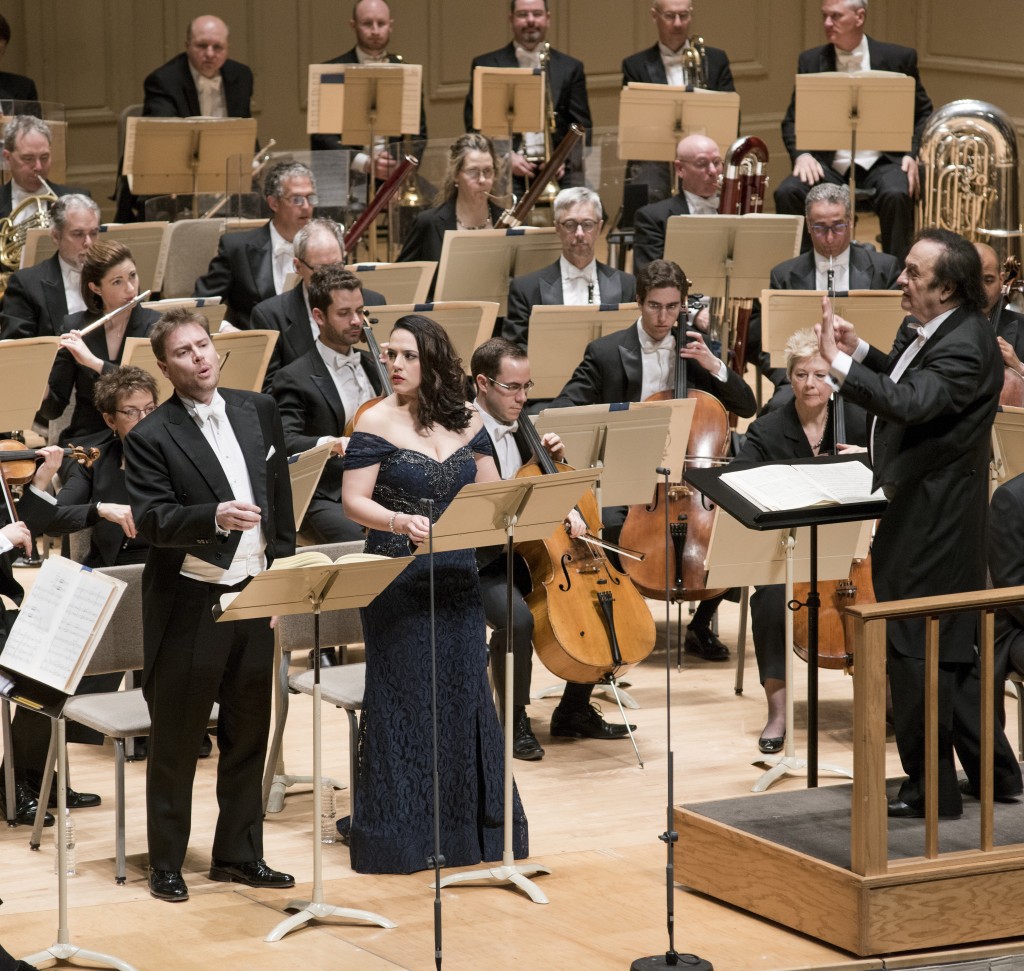BSO, Dutoit delight with Ravel’s spicy farce and Spanish postcards

Tenor Benjamin Hulett and mezzo-soprano Daniela Mack perform in Ravel’s “L’Heure espagnole” with Charles Dutoit and the BSO Thursday night. Photo: Liza Voll
It was enough to make the statues in Symphony Hall blush. But as performed in concert Thursday night by five lively singers and the Boston Symphony Orchestra under Charles Dutoit, Ravel’s racy French farce L’Heure espagnole proved far too charming and humane to be banned in Boston.
The one-act tale of the clockmaker’s wife and the shy, brawny muleteer who carries her lovers up and down stairs inside grandfather clocks, matched with suitably surrealistic sounds from the master orchestrator, brought chuckles from the audience–as well as a few audible leers, if there is such a thing—and cheers at the end.
A first half consisting of Ravel’s Rapsodie espagnole (the opera’s fraternal twin, composed later the same year) and Falla’s Nights in the Gardens of Spain put listeners in an Iberian frame of mind for the Toledo-set opera.
All but one of the singers were making their BSO debuts Thursday night. As Concepcion, the center of attention (and traffic cop) for four male admirers, mezzo-soprano Daniela Mack sang with agility and enough heft to remind listeners that Ravel was parodying more serious operas here.
In a rare moment to herself, Mack as Concepcion wryly delivered the opera’s best-known set piece, the meditation on inadequate lovers “Oh! la pitoyable aventure!”
Vocal settings were mostly in recitative style, which suited baritone Jean-Luc Ballestra as the muleteer Ramiro, a man of few words singing in short clipped phrases—and in Ballestra’s case, very convincing working-class French diction.
In a droll, strikingly modern plot twist, as the characters around him became more and more crazed with lust and self-consciousness, the clueless Ramiro ascended into a Zen-like state induced by the ticking of the clocks in the shop.
The role of Torquemada the clockmaker is written for a nasal character tenor in the manner called “Trial” (after one of its early exponents), and François Piolino delivered his part in an agreeable, unexaggerated version of that style.
Benjamin Hulett exhibited quite a splendid romantic tenor as the loquacious poet Gonzalve, apparently more besotted with his own literary inspirations than with the flesh-and-blood Concepcion.
Baritone David Wilson-Johnson, the only BSO non-debutante in the cast, sang with clear tone and lucid diction as the old banker Don Inigo, catching the opera buffa spirit with a characterization that combined pomposity with an endearing vulnerability.
The in-concert format seemed especially to suit this opera, which has been criticized in more realistic stagings for its, well, clockwork plot and characterizations. That touch of abstraction put the spotlight on Ravel’s wit rather than psychological questions.
With one exception—Hulett as Gonzalve, who used exaggerated gestures and played for laughs—the cast gently inhabited their characters, letting the humor arise from the premise of fairly normal people caught up in an absurd situation. The key to successful farce is involving the audience in the action while concealing the actor’s/singer’s art, and this cast “got” that, dramatically and vocally.
The score is loaded with sly references to Wagner, Debussy’s Pelléas, and other French operas, but even a listener not catching the allusions could enjoy the endless stream of orchestral “special effects” that Dutoit and his players kept flowing under the action.
In the end, the “Spanish hour” emerged as a concept like the “New York minute”—you can get a lot done in it.
The concert opened in much more leisurely fashion with evocative orchestral postcards from Spain. Dutoit opened Ravel’s Rapsodie with the slender sound of muted violins like shreds of cloud in the night sky, and went on to present the whole piece as an “insubstantial pageant,” extraordinarily light and liquid even amid rat-a-tat Spanish dance rhythms and occasional bursts of orchestral fortissimo.
By contrast, Falla’s Nights had a more traditional, Wagner-era solidity to their orchestration, colorful as it was. Perhaps this was inevitable in music originally conceived not for piano and orchestra, but for piano solo.
Despite the placement of the Steinway concert grand front and center on the Symphony Hall stage, Falla’s score did not resemble a piano concerto at all, but rather an orchestral piece with a piano as one of many instruments, contributing harp-like or guitar-like figuration and taking the melody once in a while.
Spanish pianist Javier Perianes played his part with style and appropriate modesty, coordinating seamlessly with Dutoit in near-constant expressive rubato and adding glinting highlights to the piece’s nocturnal tableaux.
At the bows, pianist and conductor conferred in view of the audience, and then Perianes went to the piano and coaxed out a dreamy encore, Grieg’s Nocturne, Op. 54, No. 4. One would like to think Dutoit had invited the pianist to stick around and show the audience what he could do with a real solo piano piece.
The program will be repeated 8 p.m. Saturday. bso.org; 617-266-1200.
Posted in Performances